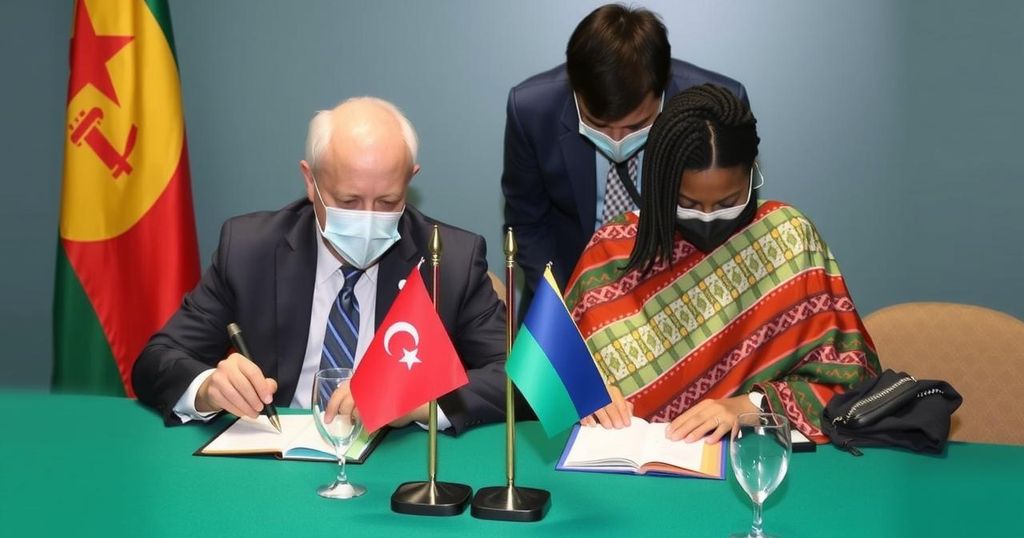International Support for Ankara Declaration: A New Era for Ethiopia-Somalia Relations

International partners, including the AU and the US, support the Ankara Declaration signed between Ethiopia and Somalia, emphasizing the need for its swift implementation. The agreement promotes sovereignty, cooperation, and economic benefits, particularly focusing on Ethiopia’s access to the sea, acknowledging historical tensions, and fostering regional stability.
A coalition of international partners, including the African Union, the United States, and the United Kingdom, has expressed enthusiastic support for the Ankara Agreement, which was signed by Ethiopian Prime Minister Abiy Ahmed and Somali President Hassan Sheikh Mohamud on December 11, 2024. This agreement is lauded as a significant milestone that underlines the necessity for prompt implementation of measures that promote cooperation and address the mutual interests of both nations.
Moussa Faki Mahamat, the Chairperson of the African Union Commission, characterized the agreement as an essential act of responsibility and urged both leaders to take immediate action on its stipulations. The United States highlighted the agreement’s reaffirmation of national sovereignty and territorial integrity while expressing eagerness for technical negotiations aimed at securing Ethiopia’s access to the sea, which is anticipated to benefit both nations economically.
The Ankara Declaration, which was ratified during a summit hosted by Turkish President Recep Tayyip Erdoğan, emphasizes the commitment of Ethiopia and Somalia to uphold sovereignty and territorial integrity. The declaration mentions the potential benefits of enhancing Ethiopia’s access to maritime resources while addressing historical tensions by acknowledging and setting aside differences.
The United Kingdom’s Foreign, Commonwealth, and Development Office praised the agreement, noting its role in fostering cooperation and stability in the Horn of Africa. The European Union reinforced the message of mutual respect and collaboration as vital components in reducing tensions between the nations. Moreover, the United Nations welcomed the declaration as a constructive gesture characterized by friendship and mutual respect.
The Ankara Declaration encompasses plans for technical negotiations regarding Ethiopia’s sea access, scheduled to occur starting February 2025 and concluded within four months. Both nations pledged to collaborate closely on commercially advantageous arrangements under Somalia’s sovereignty.
Significantly, the declaration recognizes the contributions made by Ethiopian soldiers in Somalia, expressing appreciation for their sacrifices. Furthermore, it commends Türkiye for its support in facilitating this agreement. The establishment of this accord follows rising tensions due to Ethiopia’s prior announcement regarding plans to develop a port in Somaliland, a move considered by Somalia as an infringement upon its sovereignty.
The Ankara Declaration stands as a pivotal development in the diplomatic relations between Ethiopia and Somalia, particularly regarding maritime access and economic cooperation. The historical tensions rooted in territorial disputes and resource access have often hampered collaborative efforts in the Horn of Africa region. Given the context of Ethiopia’s recent discussions about establishing a port in Somaliland, the reconciliation exemplified through the Ankara Agreement is crucial for fostering regional stability and mutual prosperity.
In summary, the Ankara Declaration represents a significant diplomatic achievement between Ethiopia and Somalia, drawing strong support from various international stakeholders. It establishes a framework for cooperation that prioritizes mutual respect, economic benefit, and territorial integrity, thereby addressing longstanding tensions. The positive reception from international partners accentuates the declaration’s potential to foster peace and development in the Horn of Africa.
Original Source: addisstandard.com








